The plenary sessions are available to all Turbo Expo virtual conference attendees. The plenary sessions will be held from 8:00 – 9:00 am Eastern Time. ASME IGTI awardees will be recognized following each plenary session from 9:00 – 9:30 am Eastern Time. Register to attend these highly informative plenary sessions and support your peers as they are awarded for their industry contributions!
Tuesday, June 8, 2021
8:00 – 9:00 am Eastern Time
Opening up the Design Space to Afford Efficient Gas Turbines Using H2 and Biofuels
Nations of the world are seeking a transition to a sustainable carbon neutral existence by 2050; a society driven speed unparalleled in modern times. The ability to quickly apply and adapt turbine technology to carbon neutral fuels will help to accelerate the transition to sustainable energy systems. For stationary power generation these fuels could include, amongst others, high purity hydrogen, hydrogen and natural gas blends, ammonia, and synthetic carbon neutral natural gas. For this panel the discussion will focus on hydrogen and natural gas blends and high purity hydrogen fuels for stationary gas turbine power generation. For flight applications carbon neutral fuels, owing to the high specific energy requirements, will likely include liquid fuels based on biomass or synthetic fuels based on recycled carbon upgraded with renewable hydrogen. The panel will explore the impact of these carbon neutral fuels on gas turbine performance, components, ancillary equipment, and the fundamental mechanism effecting performance of these machines for stationary power and flight applications.
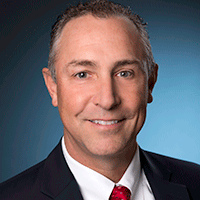
Moderator
Jeff Benoit
Power Systems Mfg., LLC
Jeff is Vice President of Strategy and Marketing for Power Systems Mfg., LLC or PSM, a leading independent multi-OEM gas turbine service solution provider for the global power generation industry.
In current role, Jeff is responsible for product management and marketing, along with strategy and business development. Jeff has been in the power industry since 1986, starting his career with GE where he held positions of increasing technical responsibility and organizational leadership across their Aviation and Gas Turbine power businesses before joining PSM in 2001.
Jeffrey, a holder of 4 patents and numerous industry peer-reviewed technical papers, received his BSc. In Mechanical Engineering from Clarkson University and MSc. In Mechanical Engineering from Massachusetts Institute of Technology (MIT).
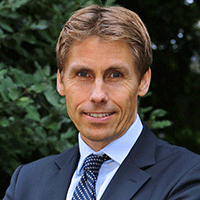
Moderator
Christer Björkqvist
ETN Global
Christer Björkqvist is the Managing Director and founder of ETN Global, an association that bring together and foster cooperation among the stakeholders of the gas turbine industry, its associated equipment providers and users. The mission is to accelerate research, development and demonstration of carbon-neutral energy solutions. Prior to the foundation of ETN in 2005, Christer Björkqvist was the General Manager of the association of European Manufacturers of Gas Turbines for a period of 5 years. In his current position he has successfully coordinated several research projects and established a platform for technology advancement, knowledge sharing and development of best practises and standards.
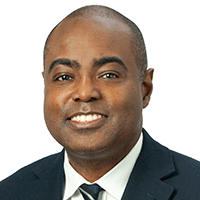
Speaker
Dr. Sean Bradshaw
Fellow, Sustainable Propulsion
Pratt & Whitney
Sean Bradshaw is the technical fellow for Sustainable Propulsion at Pratt & Whitney, a business unit of Raytheon Technologies. Sean's primary focus is on the advanced technologies required for environmentally-sustainable aircraft propulsion systems. This includes developing and maintaining a sustainability strategy across Pratt & Whitney that integrates with Raytheon Technologies. Sean also serves as the Vice Chair & Treasurer of the Gas Turbine Association, an adjunct professor of mechanical engineering at Columbia University, and a member of the American Society of Mechanical Engineering Heat Transfer Committee. He holds a bachelor science, a master of science, and a doctor of philosophy in aeronautics & astronautics from the Massachusetts Institute of Technology.
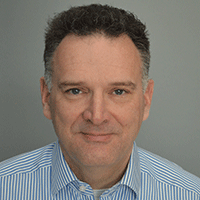
Speaker
Geert Laagland
Head of Engineering
Vattenfall NV
Geert Laagland joined Vattenfall in 2006. He was engineering manager and commissioning manager for the Magnum 1400 MW CCGT in Eemshaven in The Netherlands, commissioned in 2013. After this he worked as technology coordinator in Asset Management, working on multiple technical topics amongst options to decarbonize heat and power plants. He returned in 2017 to the projects department as director of engineering. Before joining Vattenfall he worked 4 years at the Royal Netherlands Weather Service as manager of the instrumentation division, 10 years at KEMA on performance testing of power plants and 10 years as naval officer in the Royal Netherlands Navy.
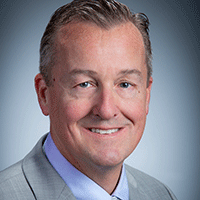
Speaker
John Mason
Director, Technology and New Product Development
Turbomachinery Products
Solar Turbines Inc.
John is currently the Director of Advanced Technology and New Product Development at Solar Turbines with the accountability of developing and executing Solar's strategic vision by developing advanced technology applications to expand Solar's gas turbine portfolio and product capability. John has more than 27 years of gas turbine design and technical leadership experience at Solar. He holds a BS in Mechanical Engineering from the University of California at Irvine, and an MS in Mechanical Engineering from the University of Southern California.
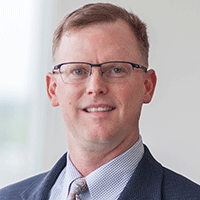
Speaker
Brian Allen
Vice President, Product Line Management
Mitsubishi Power Americas
Brian manages Mitsubishi Power GTCC products offered in the Americas. He is responsible for developing competitive gas turbine products and solutions, and is leading the hydrogen gas turbine product development strategy to support the U.S. power industry transition to full decarbonization. Brian has spent 24 years in the gas turbine and power industry, and has a BS in Mechanical Engineering from the University of Florida, MS in Mechanical Engineering from Texas A&M University, and an MBA from Carnegie Mellon University.
Wednesday, June 9, 2021
8:00 – 9:00 am Eastern Time
Opening up the Design Space Through Computations and Machine Learning
Gas turbines have transformed the world impacting billions of people around the globe on a daily basis. In 2019 gas turbines transported 4.5 billion people by air1 and generated nearly 6300 Terawatt-hours2 respectively. The global population is expected to grow from 7.7 billion in 2019 to over 9 billion in 2040. As demand increases for the aviation and power generation industries sustainability will be an increasingly important design consideration. Improved component and sub-system designs will play a critical role in enabling sustainable designs and their integration at the system level will become increasingly important: engine/airframe for aviation and gas turbine/grid for power generation. Human innovation is the key to meeting market demands subjected to environmental constraints. Modeling and simulation (M&S) will play a key role in fueling innovation at the component, sub-system and system level unlocking the potential of emerging technologies and their integration into larger ecosystems.
Advances in 5 key M&S pillars will play an important role in next generation designs:
(1) digital thread
(2) digital twin
(3) first principles high fidelity simulation
(4) multi-fidelity MDAO and
(5) machine learning / artificial intelligence.
As algorithms, physics models, software and hardware evolve, the strategic role of these 5 key pillars for early to advanced design phases needs to be defined and operationalized by industry to remain competitive.
Technical Topics of Interests for Design:
- Digital Thread
- Digital Twin
- First principles high-fidelity simulation
- Multi-fidelity MDAO
- Machine Learning / AI
1 ICAO Annual Report, 2019
2 bp.com/statisticalreview
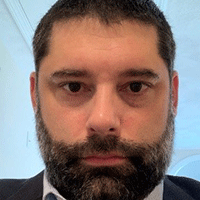
Moderator
Dr. Gregory M. Laskowski
Dr. Gregory Laskowski is Director of Fluid Dynamics at Dassault Systèmes responsible for supporting the development and deployment of Navier-Stokes and Lattice-Boltzmann CFD solutions. Dr. Laskowski joined Dassault Systèmes in 2018 after having spent nearly 14 years at General Electric, first at GE Global Research and then at GE Aviation, assuming increasing levels of responsibility culminating in a Consulting Engineer position from the Chief Engineers Office. During that time, he supported the development of advanced CFD tools and methods for aircraft engine and power generation product development. His primary research interest is in turbulence simulation and modeling and has been awarded several INCITE and ALCC supercomputing grants from US DoE. Dr. Laskowski is an inventor on 15 patents or pending patents and an author on over 85 papers in these respective industries. He holds a BS in Aerospace Engineering from Penn State, an MS in Aerospace Engineering from University of Cincinnati, a Research Masters in Aeronautics and Aerospace from the von Karman Institute for Fluid Dynamics and a PhD in Aeronautics and Astronautics from Stanford University. He was a postdoctoral researcher at Sandia National Laboratories in Livermore CA prior to entering industry. Dr. Laskowski is a fellow of ASME and a member of AIAA.
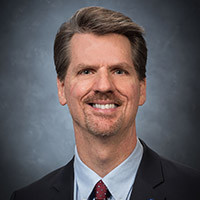
Moderator
Dr. James D. Heidmann
Dr. James (Jim) Heidmann currently serves as Manager of NASA’s Advanced Air Transport Technology Project. In this capacity, he leads NASA’s technology development for subsonic transport aircraft. Prior to this role, he served as Acting Deputy Director of NASA’s Advanced Air Vehicles Program, managed NASA’s Transformational Tools & Technologies Project, and also served as Chief of the Turbomachinery and Heat Transfer Branch. In addition to these management roles, Dr. Heidmann spent 20 years as an Aerospace Research Engineer, publishing over 20 papers and journal articles in the area of turbomachinery aerodynamics and heat transfer. He was elected Fellow of the American Society of Mechanical Engineers (ASME) in 2007, Associate Fellow of the American Institute of Aeronautics and Astronautics (AIAA) in 2015, and received the Outstanding Mechanical Engineer (OME) Award from Purdue University School of Mechanical Engineering in 2017. Dr. Heidmann received a Bachelor of Science in Mechanical Engineering from the University of Toledo in 1986, Master of Science in Mechanical Engineering from Purdue University in 1988, and Doctorate in Mechanical and Aerospace Engineering from Case Western Reserve University in 1997.
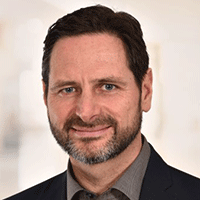
Speaker
Dr. Dirk Nürnberger
Manager GT Technologies
Siemens Energy
Manager - Gas-Turbine Technology Development (since 2017)
Development & Implementation of advanced aero-thermal-mechanical Design Concepts & Methods for Gas-Turbines
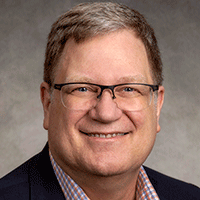
Speaker
Robert D. Gregg III
Chief Aerodynamicist
Boeing Commercial Airplanes – Flight Sciences
Robert Gregg is the Chief Aerodynamicist for Boeing Commercial Airplanes. In this capacity, Robert is responsible for the strategic direction of the Flight Sciences organization, leads the CFD activities across the enterprise and leads the enterprise Wind Tunnel Capability Steering Team. Robert received his Bachelor of Science degree in Aeronautics and Astronautics from the University of Illinois in 1978 and began his career at the Douglas Aircraft Company that same year. In 1984 he received his Master of Science degree in Aerospace Engineering from the University of Southern California. Robert has 41 years of experience in aircraft development, advanced aircraft and aerodynamic concepts, and aerodynamic research. In 2011 he became Chief Engineer of the Product Development Flight Sciences Group. His focus in that position was managing the configuration development of the 737 Max, 787-10X, and 777X along with managing the Flight Sciences Technology portfolio.
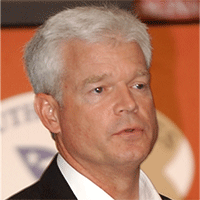
Speaker
Douglas B. (Doug) Kothe, Ph.D.
Director, Exascale Computing Project
Oak Ridge National Laboratory
Douglas B. Kothe (Doug) has over three decades of experience in conducting and leading applied R&D in computational science applications designed to simulate complex physical phenomena in the energy, defense, and manufacturing sectors. Doug is currently the Director of the U.S. Department of Energy Exascale Computing Project. Prior to that, he was Deputy Associate Laboratory Director of the Computing and Computational Sciences Directorate at Oak Ridge National Laboratory (ORNL). Other prior positions for Doug at ORNL, where he has been since 2006, include Director of the Consortium for Advanced Simulation of Light Water Reactors, DOE’s first Energy Innovation Hub (2010-2015), and Director of Science at the National Center for Computational Sciences (2006-2010).
Before coming to ORNL, Doug spent 20 years at Los Alamos National Laboratory, where he held a number of technical and line and program management positions, with a common theme being the development and application of modeling and simulation technologies targeting multi-physics phenomena characterized in part by the presence of compressible or incompressible interfacial fluid flow. Doug also spent one year at Lawrence Livermore National Laboratory in the late 1980s as a physicist in defense sciences.
Doug holds a Bachelor in Science in Chemical Engineering from the University of Missouri – Columbia (1983) and a Masters in Science (1986) and Doctor of Philosophy (1987) in Nuclear Engineering from Purdue University.
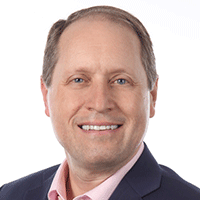
Speaker
Christopher Lorence
Chief Engineer & General Manager
GE Aviation
As the Chief Engineer, Chris Lorence leads technical excellence and design quality for the engineering team at GE Aviation to develop and support safe, reliable, and efficient products and services. He is the Champion and business leader for product safety, certification, airworthiness, and is responsible for ensuring regulatory compliance worldwide. The Chief Engineers Office global team he leads contains over 1000 technical specialists across a wide range of disciplines. He is also responsible for the technical development of the broader engineering team, with particular focus on our Edison Engineering Development Program for early career engineers.
Chris serves on the Industry Advisory Board of the American Society of Mechanical Engineers, the Advisory Board of the Department of Aerospace Engineering and Engineering Mechanics at the University of Cincinnati, and the Advisory Board of the Department of Mechanical Engineering and Materials Science at Duke University.
Education: Chris grew up in West Hartford, Connecticut. He holds B.S., M.S., and Ph.D. degrees in Mechanical Engineering from Duke University.
See Chris Lorence's full bio here
Thursday, June 10, 2021
8:00 – 9:00 am Eastern Time
Engineering in 2030 – How Must Our Educational Programs Change to Better Equip the Needed Workforce
Adaptation of critical industries like power generation, transportation, and heavy industry for an ever-shifting society, economy, and climate, necessitates an agile workforce. Educational innovation from primary school through professional development can be used to provide students the necessary skills to not only adapt to varying conditions, but be the drivers of change. There is clear momentum towards climate neutral targets in both aviation and power generation sectors, which means that the next generation of engineers must be able to work at the intersection of turbine technology that will be integrated renewables, zero carbon fuels like hydrogen, hybridized and electric propulsion systems, and cyber-physical systems. The workforce must also be cognizant of the external forces driving the direction of the discipline, including regulation, security, economics, and globalization. Four distinguished panelists will discuss innovative ideas for addressing our industry’s need for a next-generation workforce.
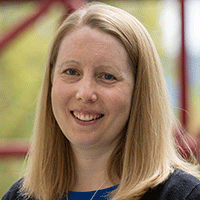
Moderator
Jacqueline O’Connor, Ph.D.
Dr. Jacqueline O’Connor is an Associate Professor of Mechanical Engineering and the director of the Penn State Center for Gas Turbine Research, Education, and Outreach. Her laboratory, the Reacting Flow Dynamics Laboratory, focuses on unsteady combustion phenomena in power and propulsion technologies, including power generation gas turbines, aircraft engines, and diesel engines, using high-speed laser diagnostics. Previously, she was a post-doctoral researcher at Sandia National Laboratories in Livermore, California in the Engine Combustion Department. She received a BS from MIT in Aeronautics in 2006, and a MS and Ph.D. in Aerospace Engineering from Georgia Tech in 2009 and 2012. She is the recipient of the 2016 Irvin Glassman Young Investigator Award from the Eastern States Section of the Combustion Institute and the 2018 Dilip R. Ballal Early Career award from the ASME International Gas Turbine Institute. She is an associate fellow of the American Institute of Aeronautics and Astronautics and a fellow of the American Society of Mechanical Engineers.
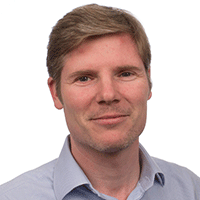
Moderator
James R Dawson
Professor, Deputy Head of Department for Research
Norwegian University of Science and Technology
James Dawson is Professor of Fluid Mechanics at the Department of Energy and Process Engineering at the Norwegian University of Science and Technology (NTNU). He is also Deputy Head of Department and Head of the Thermofluids research group. Prior to joining NTNU in 2013, he was an EPSRC advanced research fellow in the Engineering Department at Cambridge. His research interests are in combustion physics, combustion dynamics (particularly in annular combustion systems), turbulent flows and advanced measurement methods.
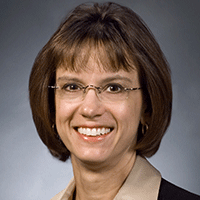
Speaker
Barbara Esker
Deputy Director, Advanced Air Vehicles Program
NASA Aeronautics Research Mission Directorate (ARMD)
Barbara Esker is the deputy director for the Advanced Air Vehicles Program (formerly Fundamental Aeronautics Program) under the NASA Aeronautics Research Mission Directorate at NASA Headquarters in Washington, DC. In collaboration with the program director, Esker supports the overall planning, management, and evaluation of the directorate’s efforts to develop tools, technologies, and concepts that enable new generations of civil aircraft that are safer, more energy efficient, and have a smaller environmental footprint. The Advanced Air Vehicles Program focuses on achieving major leaps in the performance of subsonic fixed and vertical lift aircraft to meet challenging and growing long-term civil aviation needs; on pioneering low-boom supersonic flight to achieve new levels of global mobility; and on sustaining hypersonic competency for national needs while advancing fundamental hypersonics research.
Previously, she was the acting director for the Advanced Air Vehicles Program, supporting the ARMD associate administrator in a broad range of mission directorate activities, including strategic and program planning; budget development; program review; and external coordination.
At NASA's Glenn Research Center in Cleveland prior to 2009, she served as deputy project manager for the Fundamental Aeronautics Program's Subsonic Rotary Wing project and worked in a variety of program and project management positions supporting the Low Emissions Alternative Propulsion project under the Vehicle Systems Program, the Propulsion Base Research and Technology Program, the General Aviation Propulsion Program, and the Advanced Subsonic Technology Program. She also served as deputy chief and acting chief of the Propulsion Systems Analysis Office.
In 2019, Esker was recognized with a NASA Headquarters Honor Award for exemplary leadership. She has also received a NASA Exceptional Service Medal for sustained excellence and innovation in program management, three agency-level recognitions, six team achievement awards, 27 individual contribution awards, the Glenn Federal Women’s Program Award, the Cleveland Federal Executive Board Wings of Excellence Award, and has completed OPM's Women’s Executive Leadership Program. She is also an associate fellow of the American Institute of Aeronautics and Astronautics.
Esker holds bachelor's and master's of science degrees in mechanical engineering from the University of Akron, and certificates in engineering management and in emotionally intelligent leadership from Case Western Reserve University.
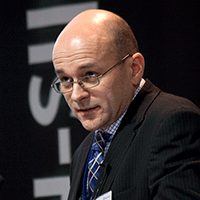
Speaker
Mark Jefferies
Chief of University Research Liaison, Rolls-Royce Group
Honorary Professor, University of Birmingham
Mark brings extensive practical experience of establishing and developing complex industry-academic collaboration. He has led Rolls-Royce's strategic global academic partnerships for over a decade; a collaborative network that now engages over 1300 people including more than 500 doctorate students at leading universities around the world.
He has over thirty years' experience in engineering and technology roles, including the leadership of multiple national and international collaborative research programmes. Mark serves on the governance boards of £multi-million research partnerships both in the UK and overseas, and works with related public and private organisations on matters of strategic investment, security, ethics, governance and international collaboration. Mark is an Honorary Professor at the University of Birmingham (UK), an Industry Fellow at the University of Bristol, a professional Chartered Engineer, a Fellow of the Royal Aeronautical Society and a Fellow of the Institution of Mechanical Engineers. He works with numerous companies, universities and other organisations on their strategies for developing major collaborations.
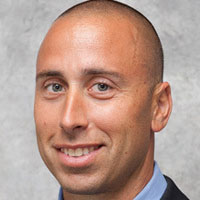
Speaker
Bryan D. Morreale, Ph.D.
Associate Laboratory Director
Research and Innovation Center
National Energy Technology Laboratory
U.S. Department of Energy
Bryan Morreale is the Associate Laboratory Director for NETL's Research & Innovation Center. Within this capacity, Dr. Morreale has the privilege of leading a diverse and dynamic workforce of several hundred scientists and engineers tackling some of the nation’s most pressing energy challenges associated with effective energy production, efficient energy conversion and environmental sustainability.
Prior to his current role, Dr. Morreale has held numerous positions within NETL providing strategic, managerial, and technical leadership, including the Senior Technical Advisor to the Laboratory Director and the Director of the Molecular Science Division. During Dr. Morreale's professional career, he has contributed to over 100 publications and presentations in areas including hydrogen separation, membrane reactors, carbon capture, natural gas utilization and fluid properties at extreme and conditions. In addition, Dr. Morreale has been invested in numerous other activities, including academic roles at the University of Pittsburgh and Carnegie Mellon University, organizational roles for The Minerals, Metals and Materials Society and American Institute of Chemical Engineers, an Energy Ambassador for the National Academy, and a member of the Materials Genome Initiative’s Strategic Planning Committee.